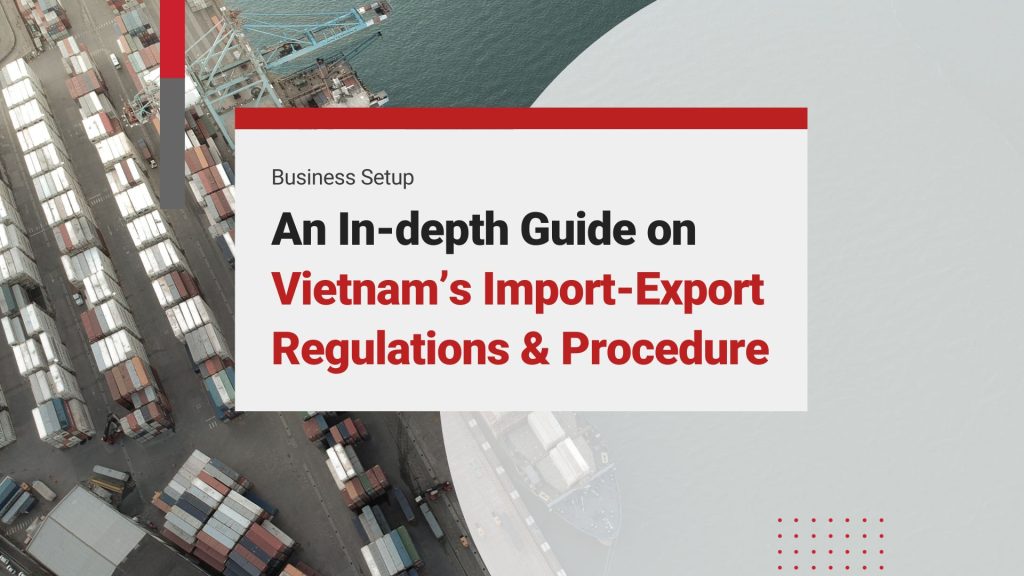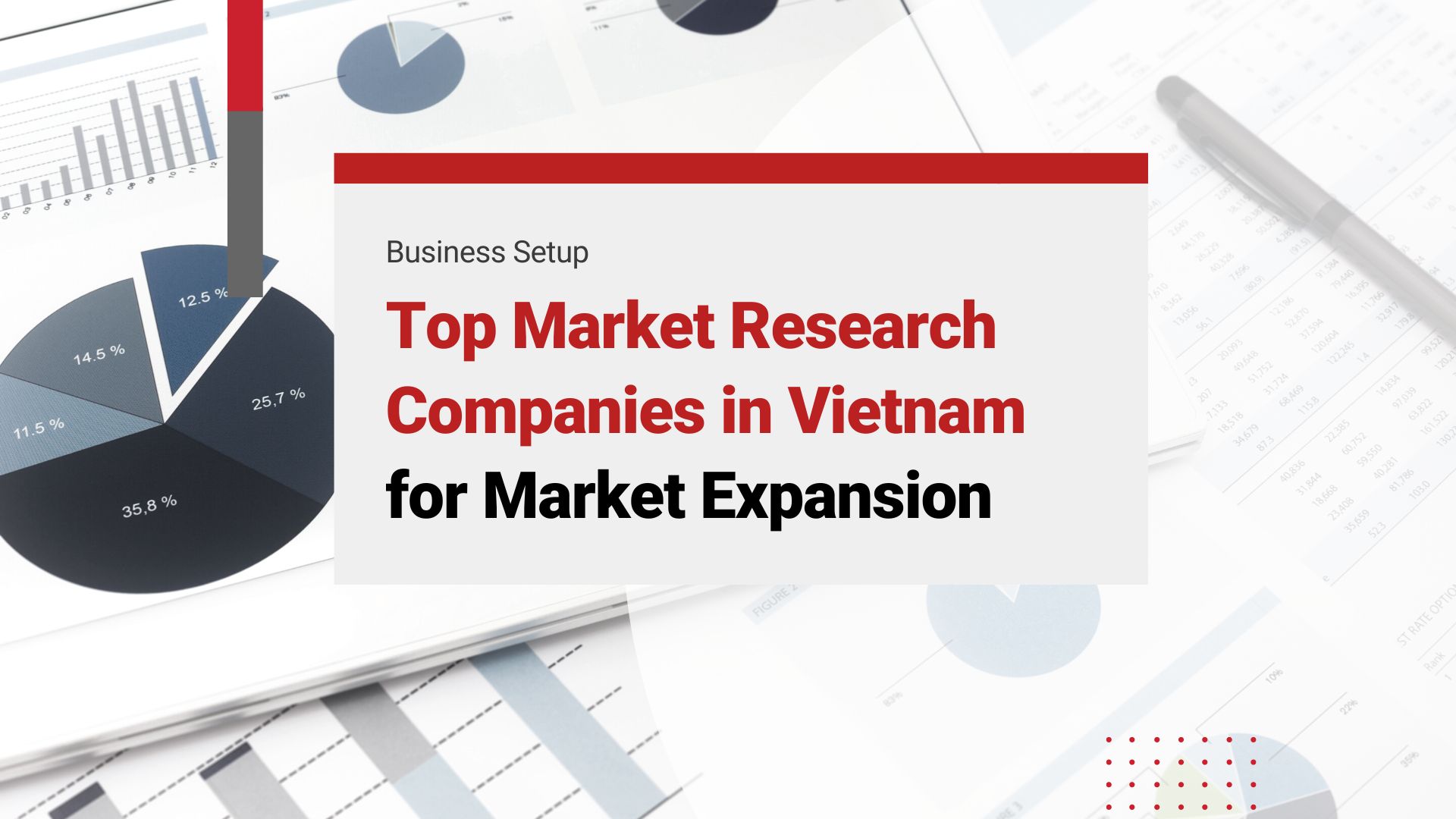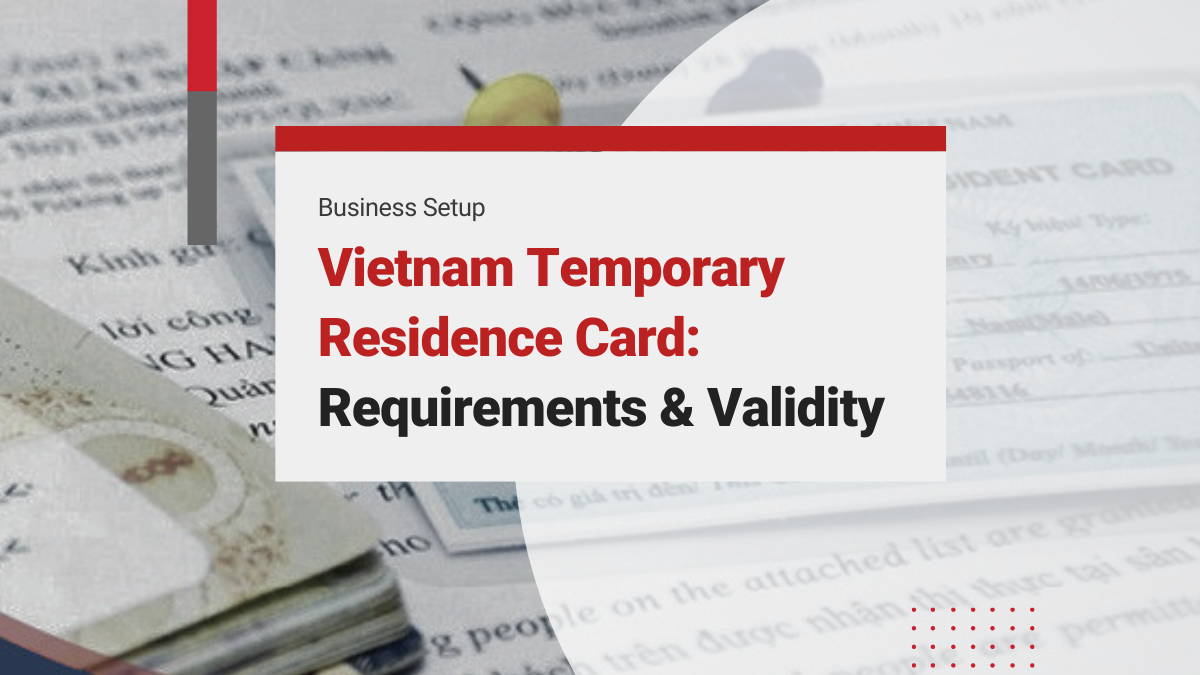Vietnam’s market reforms since the 1990s have turned it into a major hub for global trade. By joining ASEAN’s free trade area, the WTO, and multiple FTAs like CPTPP, EVFTA, and RCEP, the country has expanded access to international markets and attracted growing investment. Export performance has been strong — from USD 282.7 billion in 2020 (up 7%) to about USD 405.5 billion in 2024 (up 14.3% year-on-year), with imports reaching USD 380.8 billion.
Government initiatives and trade liberalization make Vietnam an appealing destination for startups and SMEs entering the import-export sector. However, investors must stay informed on evolving trade laws, customs procedures, and duties. This guide offers concise, up-to-date insights on establishing an import-export business in Vietnam, including licensing, prohibited goods, and 2025 regulatory updates.
Investing in Vietnam’s Import and Export Industry? Let us simplify your business processes:
Setting Up an Import-Export Business in Vietnam
Vietnam does not require a separate import-export license to set up a trading company. Both local and foreign investors can form such businesses, provided their registered business lines include the relevant goods. Vietnamese firms may trade all non-prohibited items listed in their registration. Foreign investors must register with the Department of Planning and Investment and obtain an Investment Registration Certificate (IRC) allowing trading activities. Existing firms expanding into import-export must update their IRC accordingly.
Once properly registered, no general import-export license is needed, as Vietnam grants automatic trading rights under WTO rules. However, specific permits are required for controlled goods like pharmaceuticals, agrochemicals, or cultural products. Foreign-invested firms may import machinery or materials only for approved business use, and importing unrelated goods requires an amended license. Separate permits may also apply for distribution, though pure import-export trading remains open to foreign investors.
Import-Export Restrictions and Controlled Goods
Vietnam’s Trade Law and the Law on Foreign Trade Management define which goods are prohibited or restricted for import and export. All businesses must verify that their products are permitted and meet any special conditions.
Prohibited exports: These include weapons, military or encryption equipment, antiques, natural forest timber, endangered wildlife and plants (CITES-listed), and toxic chemicals in Category 1. Exports of cultural artifacts or raw forest products are strictly banned. Refer to Appendix I of Decree 69/2018 (and its updates) for the full list.
Prohibited imports: Banned items include weapons, explosives (except authorized industrial ones), military equipment, fireworks, narcotics, toxic chemicals, used consumer goods, old machinery, second-hand vehicles, and illegal publications. Cigarettes, cigars, and cultural materials are tightly controlled. From 2025, Vietnam also bans importing e-cigarettes and heated tobacco products for public health reasons.
Restricted and conditional goods: Some goods require ministry approval or special permits before trading. Examples include explosives, explosive precursors, certain chemicals, and items controlled under treaties like CITES or ozone-depleting substances. Pharmaceuticals, medical devices, cosmetics, pesticides, and food products are conditional imports requiring registration or certification with relevant ministries. Import-export firms must secure these permits in advance or risk customs rejection.
Every shipment in Vietnam must meet government standards on quality, safety, and customs procedures. The country enforces strict controls to protect consumers and the environment while fulfilling international commitments.
Compliance with Standards and Customs Procedures
Technical standards and quarantine: Importers must comply with Vietnam’s technical and sanitary/phytosanitary (SPS) rules. Agricultural and animal products require quarantine certificates and inspection, while food, pharmaceuticals, and cosmetics must meet local safety standards. Imports of telecom or electronic goods need type approval before clearance. Compliance is required for customs release.
Customs declarations: All imports and exports must be declared electronically via the VNACCS/VCIS or National Single Window system (vnsw.gov.vn). A standard dossier includes the customs form, commercial invoice, packing list, bill of lading/airway bill, and any necessary permits or certificates (such as origin or import licenses).
Customs procedure and clearance: After submission, shipments are classified into green (auto), yellow (document check), or red (physical inspection) channels. Importers must register a Tax ID and use digital signatures. Duties must be paid before release. Vietnam’s ongoing “Digital Customs” initiative will automate and integrate procedures regionally through the ASEAN Single Window by 2025.
Documentation tips: Ensure all documents are accurate and consistent, with correct HS codes and product descriptions. Certificates of origin must be valid to claim FTA tariff preferences. From 2025, new rules for e-commerce imports remove some low-value exemptions—small shipments may now incur duties. Staying updated with customs changes helps avoid delays or penalties.
Import-Export Duties and Taxes in Vietnam
Vietnam levies duties on most goods crossing its borders under the Law on Export and Import Duties, with key exemptions to promote trade.
General rules and exemptions: Most goods traded across Vietnam’s borders or between bonded/non-tariff zones are subject to duties. Exceptions include goods in transit, exports from bonded zones, and imports used only within non-tariff zones. Movements between such zones, diplomatic shipments, and temporary imports for re-export may also qualify for exemption.
Export duties: Most exports are tax-free, supporting Vietnam’s export-oriented policy. Only select natural-resource products—such as crude oil, minerals, timber, and scrap metals—face export duties of 0–45% depending on the HS code. Exporters enjoy 0% VAT, allowing refunds for input VAT, a policy that continues in 2025.
Import duties: Vietnam applies three tariff levels:
- Preferential (MFN) rates for WTO members.
- Special preferential rates for FTA partners (e.g., ASEAN, CPTPP, EVFTA, RCEP) — many goods now enter at 0% with valid certificates of origin.
- Ordinary rates (about 150% of MFN) for non-MFN countries, though rarely applied.
Tariffs vary by product: luxury goods like cars, alcohol, and cosmetics face high rates and excise taxes, while machinery and inputs for production often have low or zero duty. Ongoing FTAs continue to phase out tariffs through 2025.
Other taxes: Imports generally incur 10% VAT and, for specific goods, Special Consumption Tax (on cars, alcohol, tobacco, etc.) or environmental protection tax (on fuel, coal, plastic bags). Manufacturers may get duty exemptions for raw materials imported for export production or investment projects in Export Processing Zones.
Exemptions and refunds: Common duty exemptions apply to temporary imports for re-export, materials for export production, imported machinery for investment projects, gifts, and humanitarian aid. Duty refunds are available for re-exported goods or warranty replacements. Businesses should consult customs experts to leverage exemption schemes and reduce trade costs.
For more information, please refer to the latest import/export regulation or contact one of our consultants.
Practical Tips and Latest Updates
Vietnam’s import-export regulatory environment is dynamic. The government is actively modernizing customs procedures and aligning regulations with international standards. Here are some additional insights for 2025 to keep your import-export business compliant and efficient:
- Harness Free Trade Agreements: Vietnam now has around 15 active FTAs, enabling exporters and importers to access preferential tariffs in markets covering most of the globe. For example, under the EVFTA, EU goods enjoy zero or reduced tariffs when imported to Vietnam, and Vietnamese exports enter the EU mostly tariff-free over a phase-out period. Similarly, the RCEP agreement (effective 2022) simplifies rules of origin and lowers tariffs across Asia-Pacific. Businesses should leverage these FTAs by obtaining the proper certificates of origin from suppliers, as it can make your imports cheaper and your exports more competitive. Keep an eye on new trade deals too – Vietnam continues to negotiate and implement agreements that could further benefit import-export operations.
- Stay Updated on New Regulations: Recent legal changes can directly impact your import-export plans. For instance, as noted, from January 2025, e-cigarettes are banned from import, and as of Feb 2025, the government ended the VAT/tax exemption for low-value e-commerce parcels – meaning even small online purchases are now taxed to better regulate cross-border e-commerce. Draft regulations in 2025 are addressing on-the-spot export/import transactions (where buyer and seller are in Vietnam but treat the sale as an export) – these may be abolished or altered soon, which will affect certain business models. A new Customs Decree (effective mid-2025) also aims to simplify procedures and formalize electronic documentation. Given such changes, regularly consult official sources like the Vietnam Customs website or trusted advisory services. The General Department of Vietnam Customs issues updates on HS code changes, documentation requirements, and duty rates every year.
- Use Professional Services When Needed: Vietnam’s import-export framework can be complex for newcomers, especially foreign startups or SMEs. Don’t hesitate to use local experts – freight forwarders, customs brokers, or consulting firms – for handling registrations, product approvals, and customs clearance. For example, product registration (for pharmaceuticals, cosmetics, etc.) with the Ministry of Health or obtaining an import permit for chemicals from MOIT can be intricate processes best managed by those with experience. Engaging a reputable service can streamline compliance, letting you focus on core business activities.
- Build Compliance into Your Supply Chain: Ensure your supply chain is aware of Vietnamese compliance needs. This includes correct labeling (Vietnam has specific labeling requirements for imported goods in Vietnamese language), ensuring all import documentation is provided by your suppliers in time, and verifying HS codes and duty rates in advance. Being proactive about compliance avoids delays at port and unexpected costs. Vietnam is increasingly enforcing penalties for customs violations or misdeclarations – under-declaring value or misclassifying goods to evade duty can lead to heavy fines or shipment seizure. It’s far better to comply fully with import-export rules and enjoy the long-term benefits of smooth operations.
Conclusion: Vietnam’s continuous integration into global trade, evidenced by its soaring import-export turnover and multiple trade agreements, offers exciting opportunities for investors and entrepreneurs. The regulatory landscape, while detailed, is navigable with the right knowledge and support. By understanding the licensing requirements, adhering to import-export restrictions, preparing proper documentation, and leveraging favorable duty/tax policies, startups and SMEs can successfully tap into Vietnam’s trade potential. Always stay informed about the latest regulations – the Vietnamese government may introduce new policies (such as tax incentives or stricter controls) as economic conditions evolve. With thorough preparation and compliance, your Vietnam import-export venture can be both compliant and highly profitable in this dynamic market.

clients worldwide

professional staff

incorporated entities in 10 years

compliance transactions yearly
Learn the Right Setup for Business
Expansion in the Vietnam
Frequently Asked Questions
Does Vietnam Have Tariffs
- Yes, Vietnam imposes tariffs on imported goods. Tariff rates vary depending on the product and trade agreements in place.
What Are The Vietnam Tariffs
- Vietnam's tariffs are import and export duties applied to goods entering or leaving the country, with rates varying by product type. The country follows the ASEAN Harmonized Tariff Nomenclature and offers reduced tariffs under various free trade agreements. Tariff rates generally range from 0% to 35%, depending on the item and trade agreement.
What Does Vietnam Import
- Vietnam imports machinery, electronics, petroleum products, steel, textiles, and raw materials for manufacturing. It also brings in consumer goods, chemicals, and agricultural products.
What is Vietnam's biggest export?
- Vietnam's biggest export is electronics, with smartphones and related components being the top items. Samsung, which manufactures in Vietnam, plays a major role, contributing significantly to the export of mobile phones and electronic parts.






